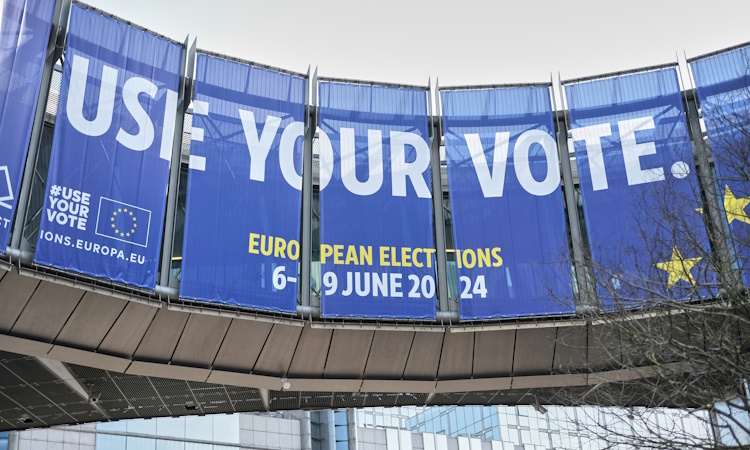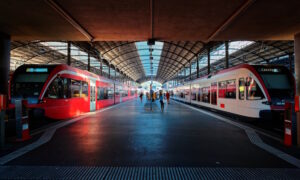
With the European Elections approaching, ANVR and TravMagazine have joined forces to map out the positions of the various parties with regard to travel and tourism. Not all Member States vote on the same day; The election will take place between 6 and 9 June. On Thursday 6 June, Dutch citizens can go to the polls to elect the Dutch members who will represent our country in the European Parliament for the next five years. Of the 13 parties that wrote to ANVR and TravMagazine, 5 responded. These are busy times for the parties. Walter Schut, deputy director of the ANVR and initiator, has his own opinion. “The industry is facing complicated and complex European regulations. Together with the TravMagazine, we asked relatively simple and relevant questions for the reader (and voter!) to all 13 parties. It is telling that many large parties do not see an opportunity to answer questions from an eminently international sector. So it’s not surprising that people are complaining that the campaigns aren’t getting going. Of the parties that did respond – thank you, of course – I see general views but few initiatives for change. Fortunately, there are also positive exceptions that give us starting points for a conversation. On balance, the impression is that international tourism gives (too) little traction among Dutch MEPs. That doesn’t make lobbying any easier. There is still a lot of missionary work for the sector for us to do. We will be working that again after 6 June.’

‘Travel is an important freedom for people, but it is also an important economic driver for many local communities. Of course, there must be a balance between the enrichment of the traveller and the enrichment of the local community. According to JA21, it is important that the local community can decide for itself as much as possible about local tourism policy. The local policy level is therefore the place par excellence, close to the citizen, to counteract possible inconveniences. In principle, it also has a great deal of freedom in this. Local government is the best place to align the needs of tourism in terms of economy and society.’ Volt (Reinier van Lanschot)
́Volt strives for sustainable tourism that respects both the interests of tourists and local communities. We advocate for eco-friendly practices, the preservation of cultural heritage, and support for local economies. Travel companies need to take responsibility for their impact and invest in local communities. Consumers are encouraged to make conscious choices, such as choosing climate-friendly accommodations, for example by making unsustainable travel facilities less attractive and investing in climate-friendly options. Together, we strive for tourism that is enjoyable and respectful of local communities and the environment. ́ ChristenUnie (Anja Haga)
‘Tourism is good for the local economy, but sometimes the pleasure of living suffers, see the situation in Amsterdam or Venice. Municipalities should have the ability to set limits on the number of hotels or Airbnbs. To this end, the Services Directive, among other things, must be amended. It is then up to municipalities to make use of that space and to weigh up the economy and the pleasure of living.’ BBB (Sander Smit)
The tourism sector contributes 10% to the GDP of the European Union, making it an important pillar of the European economy. At the same time, large flows of tourists can have an impact on local communities and therefore be grounds for restrictive measures. Such measures are best taken at local or regional level: close to the citizen and tailored to the wishes of the local population and businesses. The European Union’s powers in the field of tourism are therefore limited at the moment, and BBB must continue to do so. At the same time, regulatory fragmentation can make it difficult for travel platforms to offer their services in different European countries. The recent European regulations regarding the exchange of data regarding short-term rentals can be helpful here. In addition, travel companies themselves can also be expected to make an effort to prevent overtourism. This may also be in the interest of the travel sector itself if it prevents drastic government measures. Finally, consumer awareness can help prevent overtourism. In addition, BBB wants Timmermans’ oppressive Nature Restoration Act, which threatens to close off the European countryside, nature reserves and agriturismos for recreation, to be definitively off the table. Otherwise, overtourism in cities threatens to increase further. Recreation at the farmer’s campsite in the quiet countryside must remain fully possible.’ SGP (Bert-Jan Ruissen)
“Leisure is freedom. Traveling to other countries is educational and fun, but here too, everything in moderation. Temperance is a Christian virtue. There is also still a lot to experience in our own country. Travel companies and travellers may be required to behave responsibly. Tourism is the responsibility of the national and local authorities, which are best placed to weigh up the interests on the spot. Congregations that want to protect Sunday rest should keep that freedom.’  2.European Trains Policy There are still many obstacles to train travel in Europe. European proposals (MDMS) to create a single market for rail travel have met with resistance from national railway companies and have been put on the back burner. On balance, it is a real ordeal to go on holiday with the family by train to Spain or Italy. What is your view on this issue, and are you considering proposals or measures to ensure that rail can really compete with other modes of transport for holidaymakers? JA21 (Michiel Hoogeveen)
2.European Trains Policy There are still many obstacles to train travel in Europe. European proposals (MDMS) to create a single market for rail travel have met with resistance from national railway companies and have been put on the back burner. On balance, it is a real ordeal to go on holiday with the family by train to Spain or Italy. What is your view on this issue, and are you considering proposals or measures to ensure that rail can really compete with other modes of transport for holidaymakers? JA21 (Michiel Hoogeveen)
“JA21 is in favor of the European common market and is therefore also in favor of removing the obstacles that rail traffic faces. In other words, there should be competition on the railways in terms of passenger transport, which is already happening today, but it is not always going well. However, JA21 is not in favour of waving European subsidies everywhere in the EU to make this possible, especially since a large part of this bill here invariably falls on the Netherlands. However, it should be possible to use EU subsidies – if strictly necessary – to better connect border areas.’ Volt (Reinier van Lanschot)
“Volt wants a fast, reliable and emission-free network for high-speed trains, night trains and express buses to be built throughout the EU. To achieve this, there should be a European Transport Authority (ESA), with consultative legislative authority and financial resources. This gives the EU the responsibility to make this happen. The ETA will monitor investments in cross-border high-speed rail across Europe, thus closing the existing rail coherence. When this is realized, Volt wants a high-speed train network that connects all cities with more than 100,000 inhabitants. Tickets for these trains should be available through a uniform platform available across Europe. In this way, we make travelling by train easier and cheaper.’ ChristenUnie (Anja Haga)
‘A train holiday should become much more normal. It is true that there are still too many obstacles. Travel and pricing information should be much more readily available. We will support proposals to this effect. It should also be possible to arrange a rental car via the same systems. This is already normal for air holidays, because people like to have freedom of movement at their holiday destination. But I don’t think this is the biggest problem, but the price differences between the train and the plane. The ChristenUnie wants flying to be a lot more expensive and the train much cheaper. Member States should therefore levy VAT on kerosene and reduce VAT on train tickets.’ BBB (Sander Smit)
‘BBB is in favour of an expansion and better connection of the European railway infrastructure. First of all, rail links in border regions need to be better connected. The major cities also need to be better connected to each other. BBB therefore supports European cooperation and coordination around the roll-out of cross-border (rail) infrastructure, the so-called Trans-European Transport Networks (TEN-T). Infrastructure alone is not enough if the market for train tickets is still very much divided nationally. In the coming period, BBB will therefore look at how this goal can be achieved in the most efficient way. In doing so, we are critical of strong guidance from Brussels, but recognise that the interests of national state-owned enterprises should not lead to unnecessary delays.’ SGP (Bert-Jan Ruissen)
‘SGP wants a fast international train network that makes large parts of Europe easily accessible, so that the train becomes a serious alternative to flying. Major cities in Europe need to be connected by a high-speed rail network. Both ‘Brussels’ and the EU countries must invest heavily in cross-border train connections. The proceeds of a European flight tax should go to international rail traffic. International train tickets must cost the same in every EU country, both at the ticket office and online. EU countries should harmonise the rules on things like checking in luggage (the bike!), providing information on timetables, etc.’ 
3.Airline bankruptcies and regulations In recent years, several dozen European airlines have gone bankrupt. Customers have lost their money and/or have to find a way back themselves at high costs. A coalition of parties has proposed a mandatory airline guarantee fund, as already exists in Denmark, among other countries. What is your party’s view on this? JA21 (Michiel Hoogeveen)
‘JA21 is not in favour of an additional airline guarantee fund. This will be paid for by passengers of airlines that are well managed and solvent. The customer who books with a poorly managed airline has probably also had their reasons for doing so. He also has a responsibility for this. If he works through a paid intermediary, he can turn to the intermediary.’ Volt (Reinier van Lanschot)
“Volt recognizes the need to protect passengers’ rights, especially in light of the recent bankruptcies of European airlines. It is unacceptable for passengers to lose their money and face high costs of getting home as a result of such bankruptcies. That is why we support the proposal for a compulsory airline guarantee fund, as already exists in some European countries, in order to protect passengers from financial losses. In addition, we believe that the aviation sector needs to be reformed to become more sustainable and equitable. That is why we are calling for the scrapping of short-haul flights, which often have a higher environmental impact per kilometre travelled compared to alternative means of transport such as trains. This measure will not only help to reduce CO2 emissions, but also to relieve congested airports and promote investment in sustainable alternatives.” ChristenUnie (Anja Haga)
‘Customers need to be better protected in this regard. In the Netherlands, we have, among other things, the GSC fund for package holidays. This can be extended to individual flights. That would be easier for the Netherlands than setting up a new European fund. The ChristenUnie is therefore in favour of protecting customers, but the question is how we can best shape that.’ BBB (Sander Smit)
‘Setting up a ticket guarantee fund is not necessarily a European matter. This is also evident from the SEO study commissioned by ANVR into a national ticket guarantee fund. A national ticket guarantee fund can protect travellers in a cost-effective way and is relatively easy to implement. However, the same study also shows that a European Ticket Guarantee Fund offers broader coverage and has a less market-distorting effect than a national fund. The BBB is therefore in favour of an exploration of agreements in a so-called “leading group” of member states to arrive at a common guarantee fund. A collaboration in a leading group is voluntary, can lead to results sooner and is in line with BBB’s call for more ‘flexible’ cooperation within the European Union.’ SGP (Bert-Jan Ruissen)
‘Travellers with a package holiday are protected against bankruptcies of the travel agency. It would be good to examine whether the international community can extend this, for example to airline bankruptcies. After all, especially in remote places, stranded passengers rarely have alternatives for a timely return.’  4.Green Deal and aviation Like other sectors, aviation will also have to take measures to achieve net zero emissions by 2050. In the Green Deal, the EU has made clear agreements about the contribution of aviation. Through ETS, but also a minimum share (34% in 2040; 70% in 2050) of sustainable fuels. That’s great, of course, but it puts European airlines at a competitive disadvantage compared to airlines from countries outside the EU. How do you intend to prevent us from only flying intercontinental with airlines from outside the EU? JA21 (Michiel Hoogeveen)
4.Green Deal and aviation Like other sectors, aviation will also have to take measures to achieve net zero emissions by 2050. In the Green Deal, the EU has made clear agreements about the contribution of aviation. Through ETS, but also a minimum share (34% in 2040; 70% in 2050) of sustainable fuels. That’s great, of course, but it puts European airlines at a competitive disadvantage compared to airlines from countries outside the EU. How do you intend to prevent us from only flying intercontinental with airlines from outside the EU? JA21 (Michiel Hoogeveen)
‘JA21 opposes the Green Deal and voted against this measure in the last legislature, precisely because of the competitive disadvantage that European airlines experience as a result. We want to prevent this by abolishing this measure in the next legislature of the European Parliament.’ Volt (Reinier van Lanschot)
“To prevent European airlines from being at a competitive disadvantage compared to foreign carriers, we must strive for international cooperation and equivalent regulation at a global level. This can be achieved through diplomatic efforts and the establishment of bilateral and multilateral agreements to promote sustainability standards in the aviation sector. Volt advocates for a balanced approach where sustainability, economic competitiveness and international cooperation go hand in hand to ensure a viable and green future for the European aviation sector.” ChristenUnie (Anja Haga)
‘We think it’s very important to do something about emissions from aviation. The ETS and mandatory blending are good tools for this. The ChristenUnie wants all flights that land in the EU or take off from the EU to fall under these obligations. Even if these are flights operated by non-European airlines. That way, there is no competitive disadvantage for European companies.’ BBB (Sander Smit)
‘BBB takes a very critical look at one-sided standards for Dutch or European aviation. The reasoning is simple: the climate does not benefit from shifting emissions, while unilateral standards harm European aviation economically. Below we explain our position on the various measures: -ETS: For the time being, free emission allowances still apply to aviation. From 2026 onwards, these allowances will be auctioned. The income from the auction flows into an innovation fund. BBB ensures that the funds actually benefit the European aviation industry and that its international competitive position is not undermined. -Blending obligation: BBB is also in principle in favour of the blending obligation, provided that sufficient alternative fuels are produced in Europe and at a competitive price. At the moment, this is not the case because there is no long-term strategy for the production of these fuels. -Excise duties: BBB is open to phasing out the excise duty exemption for kerosene if global agreements are made on this. SGP (Bert-Jan Ruissen)
‘The SGP wants a globally functioning emissions trading system. This limits CO2 emissions internationally and creates fair competition between airlines. The SGP also advocates European agreements on the fair taxation of air travel and on excise duty on kerosene.’  5.Package Travel Directive: more or less protection for customers? In recent years, the share of package holidays in the total number of trips has continued to decline. The EU has now proposed measures (in a revised Package Travel Directive) that should lead to this most consumer-protecting directive becoming even more protective. This puts even more financial strain on travel companies. As a result, fewer and fewer travel companies will offer package holidays, with the result that fewer and fewer consumers will travel protected and thus achieve the opposite of what the EU intends. How does your party intend to prevent consumers from being put in a worse position in this regard? Or is your party going to fully support the current PTD proposals?
5.Package Travel Directive: more or less protection for customers? In recent years, the share of package holidays in the total number of trips has continued to decline. The EU has now proposed measures (in a revised Package Travel Directive) that should lead to this most consumer-protecting directive becoming even more protective. This puts even more financial strain on travel companies. As a result, fewer and fewer travel companies will offer package holidays, with the result that fewer and fewer consumers will travel protected and thus achieve the opposite of what the EU intends. How does your party intend to prevent consumers from being put in a worse position in this regard? Or is your party going to fully support the current PTD proposals?
JA21 (Michiel Hoogeveen)
‘JA21 does not support these new proposals. Just as is correctly stated in the question, the extra protection comes at a price. A price that will obviously have to be paid by the consumer, making it commercially less interesting for the travel sector to offer these package holidays. As a result, the price for such package holidays will rise even further. The opposite should happen, less regulation, so that the market can play its full role.’ Volt (Reinier van Lanschot)
“Volt strives for a balanced approach in which the interests of both consumers and travel companies are weighed. It is essential to protect consumers from financial risks when booking package holidays, but at the same time we must ensure that this protection does not hamper the provision of package holidays by travel companies. This can be achieved through a critical evaluation of the measures proposed in the renewed Package Travel Directive, looking at the impact on both consumers and travel businesses. If necessary, we will make proposals to address any imbalances and create an appropriate legal framework that both strengthens consumer protection and encourages the supply of package holidays. For example, we promote cooperation between travel companies and consumer organisations to develop guidelines that guarantee both consumer protection and the interests of travel companies.’ ChristenUnie (Anja Haga)
“We think it’s important to protect consumers, no matter how they book their holidays. We are positive about the current PTD proposals, but will try to improve them in parts. The extra costs for travel companies don’t seem to be too bad and the extra protection of customers is worth a dear thing to us. If we also protect consumers better in other cases, such as with individual tickets, consumers will be better off in all cases.’
BBB (Sander Smit)‘BBB is critical of the proposed changes to the Package Travel Directive. We are not convinced that the benefits of these changes outweigh the additional administrative burden for travel companies and regulators. BBB calls on the European Commission to focus on enforcing existing regulations in the coming years instead of further tightening them. This is essential to maintain a level playing field within the European Union. In our election manifesto, BBB argues more generally for reducing the regulatory burden, as explained in more detail in the answer to the question below.’ SGP (Bert-Jan Ruissen)
‘Proper research into the effects is needed. If the EU wants to better protect package travellers, it must be proportionate to the costs. Travellers who book something directly themselves must be properly informed about the risks they run.’  6.Regulations The enlargement of the EU, the common regulatory framework, the euro and the removal of border barriers have had a hugely positive impact on tourism in Europe. Travel entrepreneurs are of course very happy with this. Yet we hear more and more criticism, such as huge administrative obligations with the DAC directive, but also the proposed EU anti-greenwashing rules that will lead to more companies not mentioning their sustainability efforts for fear of fines. More and more, the European regulatory drive is causing reluctance among entrepreneurs. Do you understand this and what could you do about it? JA21 (Michiel Hoogeveen)
6.Regulations The enlargement of the EU, the common regulatory framework, the euro and the removal of border barriers have had a hugely positive impact on tourism in Europe. Travel entrepreneurs are of course very happy with this. Yet we hear more and more criticism, such as huge administrative obligations with the DAC directive, but also the proposed EU anti-greenwashing rules that will lead to more companies not mentioning their sustainability efforts for fear of fines. More and more, the European regulatory drive is causing reluctance among entrepreneurs. Do you understand this and what could you do about it? JA21 (Michiel Hoogeveen)
‘For JA21, deregulation must be the main task of the next Commission. For example, JA21 has vehemently opposed the legislation on CSDDD and CSRD. All these regulations entail an enormous administrative burden, but what is often forgotten is that this administrative burden comes at a high price and is in fact a burden. For the travel sector, this puts pressure on profit margins, while this does not lead to lower prices for the customer. JA21 therefore intends to oppose further regulations in the next legislature and to actively work for fewer European Rules.’ Volt (Reinier van Lanschot)
‘Entrepreneurs are drowning in the number of schemes. This stands in the way of innovation and social impact. That is why Volt wants to reduce the administrative burden, and there should be a Delta Plan for the Reduction of the Administrative Burden for entrepreneurs. The IDD should enable insurers to provide affordable options for high-value travel. The right to appropriate insurance is essential for all travellers, regardless of the travel price, to ensure financial protection and minimise risk. It is important that legislation to protect consumers and the environment does not become unnecessarily burdensome for SMEs. To improve the situation quickly, we need to reduce the administrative burden by simplifying regulations, supporting compliance and allowing for flexibility and innovation within SMEs.” ChristenUnie (Anja Haga)
‘The ChristenUnie understands that entrepreneurs sometimes find the rules too much. Sometimes there are indeed too many or contradictory rules. And then we have to abolish them as well. But we often see that they are too unclear. Or that member states themselves impose rules on top of European rules. We are, however, in favour of rules that force companies to make their business greener and to prevent people in other countries from becoming the victims of their work. But those rules must be clear. And if we apply the same rules throughout the EU, we will have a nice level playing field for all entrepreneurs.’ BBB (Sander Smit)
‘Reducing the regulatory burden is an important spearhead in BBB’s election programme. This is crucial to make European companies more competitive in all sectors, not just the travel industry. BBB therefore advocates the appointment of a separate Commissioner for Competitiveness and SMEs, who will focus exclusively on reducing the regulatory burden in both existing and future regulations. In addition, BBB will closely monitor the implementation of the European Commission’s intention to remove 25% of reporting obligations for companies. Finally, BBB is particularly critical of the CRSD and CSDDD legislation. This legislation leads to considerable administrative burdens and legal risks for large companies and, increasingly, for SMEs as well.’ SGP (Bert-Jan Ruissen)
‘SGP’s slogan is: ‘brake Europe’. The interference in Brussels goes too far. The EU must stop piling up regulations and not take the place of the entrepreneur. You always have to focus on the goal. There is no top-down regulation on how and the means by which these goals are to be achieved. The administrative burden on businesses must be drastically reduced. Trust and social appreciation for entrepreneurs must be restored and promoted.’ (Photos Shutterstock).